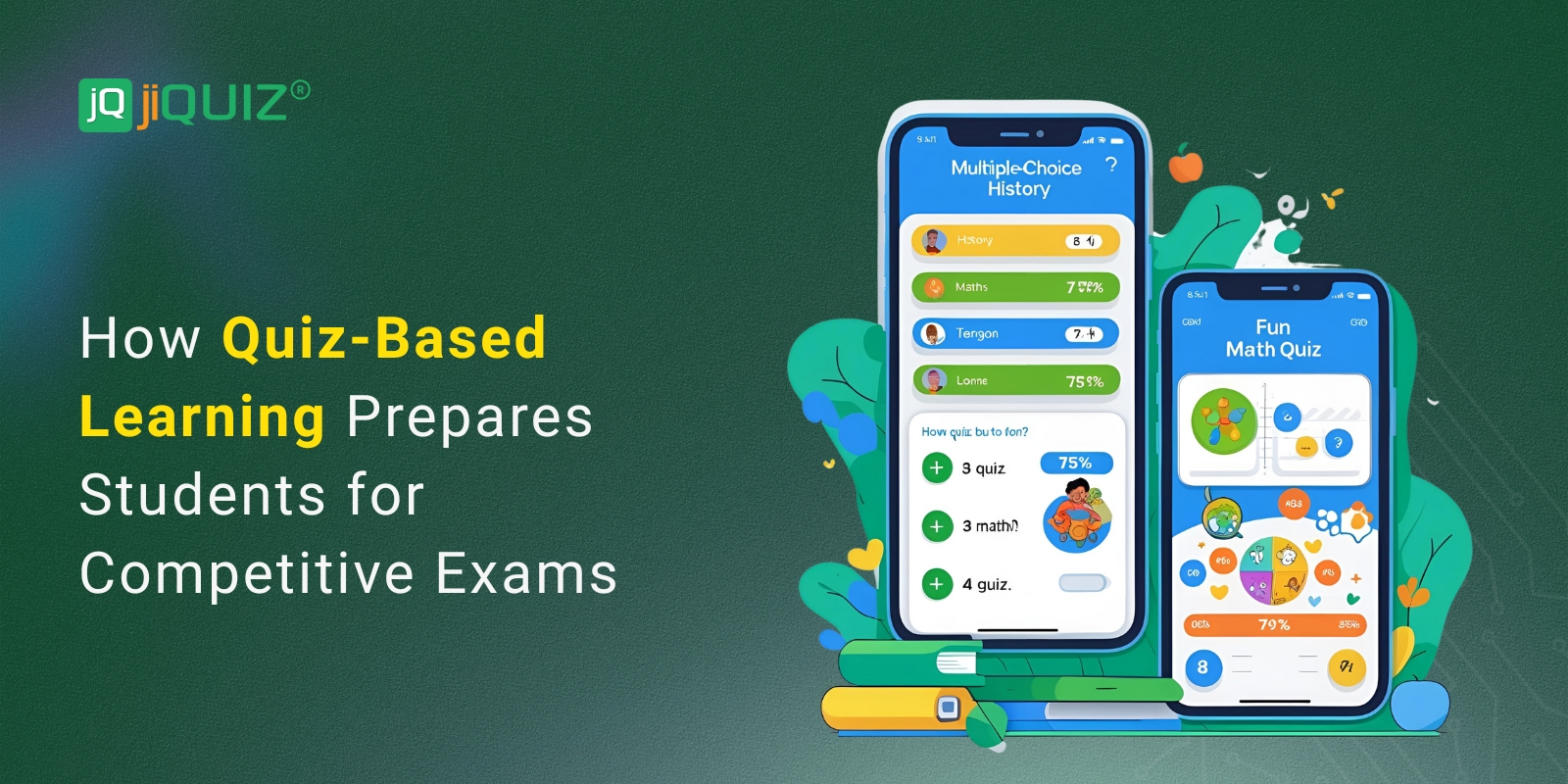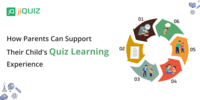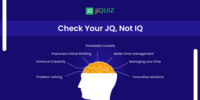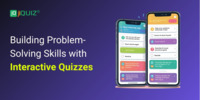- Jul 08, 2025
Share this post on:

Competitive exams – whether it’s the JEE, NEET, CAT, UPSC, GRE, or any other challenging assessment – are daunting. They demand not just rote memorization but a deep understanding of concepts, the ability to apply knowledge in diverse scenarios, and the resilience to handle pressure. Traditional learning methods often fall short in cultivating these crucial skills. Enter quiz-based learning, a rapidly gaining traction as a powerful tool for exam preparation. This isn't just about taking practice tests; it’s a fundamentally different approach to learning that addresses the specific demands of competitive examinations.
The Limitations of Traditional Learning & Why It Fails Competitive Candidates
Before we dive into the benefits of quiz-based learning, let’s understand why conventional methods often leave students underprepared. Many traditional approaches rely heavily on:
- Passive Learning: Lectures, textbooks, and notes often involve students passively receiving information. While vital for initial exposure, this passive intake doesn't guarantee understanding or retention.
- Rote Memorization: The pressure to cover vast syllabi often leads to a focus on memorizing facts and figures rather than grasping underlying principles. This makes it difficult to apply knowledge in novel situations.
- Limited Active Recall: Active recall, the process of retrieving information from memory, is crucial for long-term retention. Traditional methods rarely prioritize this process.
- Lack of Immediate Feedback: Students often don't receive immediate feedback on their understanding, leading to misconceptions and knowledge gaps that go uncorrected.
- Neglect of Time Management: Competitive exams are notoriously time-bound. Traditional learning rarely incorporates rigorous time management practice under pressure.
- Insufficient Exposure to Diverse Question Types: Competitive exams frequently feature complex and unconventional question formats. Traditional learning might not adequately prepare students for these.
Quiz-Based Learning: A Paradigm Shift in Exam Preparation
Quiz-based learning flips the script. It's an active, engaging, and iterative learning process centered around frequent quizzes and assessments. It’s more than just practice tests at the end; it’s integrated throughout the learning journey. Here's a breakdown of how it works and why it’s so effective:
1. Active Recall and Retrieval Practice – The Core Benefit
The fundamental principle behind quiz-based learning is active recall. Every time a student answers a quiz question, they are forced to retrieve information from their memory. This retrieval process, even if the answer is incorrect, strengthens neural pathways and reinforces learning far more effectively than passively reviewing material.
- The "Testing Effect": Psychological research consistently demonstrates the "testing effect" – the phenomenon where retrieval practice significantly boosts memory retention compared to repeated study.
- Spacing and Interleaving: Effective quiz-based learning incorporates spaced repetition (revisiting material at increasing intervals) and interleaving (mixing different topics within a quiz) to maximize long-term retention.
2. Identifying Knowledge Gaps – Targeted Improvement
Quizzes aren't just about getting answers right; they're about pinpointing weaknesses. When a student misses a question, it highlights a gap in their understanding. This allows for:
- Targeted Review: Instead of re-studying everything, students can focus their efforts on the specific concepts they are struggling with.
- Personalized Learning: Quiz-based platforms often provide detailed analytics, allowing students to identify patterns in their errors and tailor their learning accordingly.
- Addressing Misconceptions: Incorrect answers can reveal underlying misconceptions that need to be addressed through further explanation and clarification.
3. Building Conceptual Clarity – Beyond Memorization
Effective quiz-based learning goes beyond simply testing factual recall. It incorporates questions that require students to:
- Apply Concepts: Questions may present novel scenarios or require students to combine different concepts to arrive at a solution.
- Analyze and Evaluate: Questions may require students to critically analyze information and evaluate different perspectives.
- Explain Reasoning: Some platforms even incorporate "explain your answer" features, forcing students to articulate their thought process and solidify their understanding.
4. Developing Exam-Taking Skills – Time Management and Pressure Handling
Competitive exams are not just about knowledge; they're about performing under pressure and within a strict time limit. Quiz-based learning provides a simulated exam environment that helps students develop these crucial skills:
- Time Management: Timed quizzes force students to learn how to allocate their time effectively and prioritize questions.
- Pressure Handling: The simulated exam environment helps students get used to the stress and anxiety associated with competitive exams.
- Strategic Question Selection: Students learn to identify questions they can answer quickly and confidently and to strategically skip or return to more challenging ones.
- Pattern Recognition: Repeated exposure to different question types and formats helps students recognize patterns and develop strategies for approaching unfamiliar questions.
5. Building Confidence – A Cycle of Improvement
As students consistently engage in quiz-based learning, they experience a cycle of improvement: they identify weaknesses, address them, and see their scores improve. This builds confidence and motivates them to continue learning. The positive reinforcement of seeing progress can combat the discouragement that often accompanies competitive exam preparation.
Implementing Quiz-Based Learning: Strategies & Tools
Here's how students can effectively integrate quiz-based learning into their preparation:
- Start Early: Don't wait until the final weeks of preparation to start taking quizzes. Integrate them from the beginning of your study schedule.
- Micro-Quizzes: Break down large topics into smaller, more manageable chunks and take short quizzes after each chunk. This promotes frequent active recall.
- Mixed Topic Quizzes: Once you have a good grasp of individual topics, mix them together in quizzes to challenge your ability to apply knowledge in different contexts.
- Review Incorrect Answers: Don't just focus on getting the answers right. Thoroughly review the incorrect answers and understand why you made the mistakes.
- Simulated Exams: Regularly take full-length simulated exams under timed conditions to mimic the actual exam environment.
- Utilize Technology: Numerous online platforms and apps offer quiz-based learning tools for various competitive exams. (See below for some examples).
Tools & Platforms for Quiz-Based Learning:
- Khan Academy: Offers a vast library of practice exercises and quizzes across various subjects.
- Quizlet: A popular platform for creating and using flashcards and quizzes.
- Brainscape: Utilizes spaced repetition algorithms to optimize learning.
- Exam Preparation Apps (e.g., Unacademy, Vedantu, BYJU's): Many exam preparation platforms have integrated quiz-based learning tools.
- Custom-Made Quizzes: Create your own quizzes using online quiz makers or even by hand.
Conclusion: Embrace the Power of Quizzes
Quiz-based learning isn’t just another study technique; it's a fundamental shift in how we approach exam preparation. By embracing active recall, targeted review, and simulated exam conditions, students can significantly enhance their understanding, improve their exam-taking skills, and boost their confidence. It's a proactive, engaging, and ultimately more effective way to conquer the challenges of competitive exams and achieve your academic goals. Stop passively studying and start actively testing your way to success.









